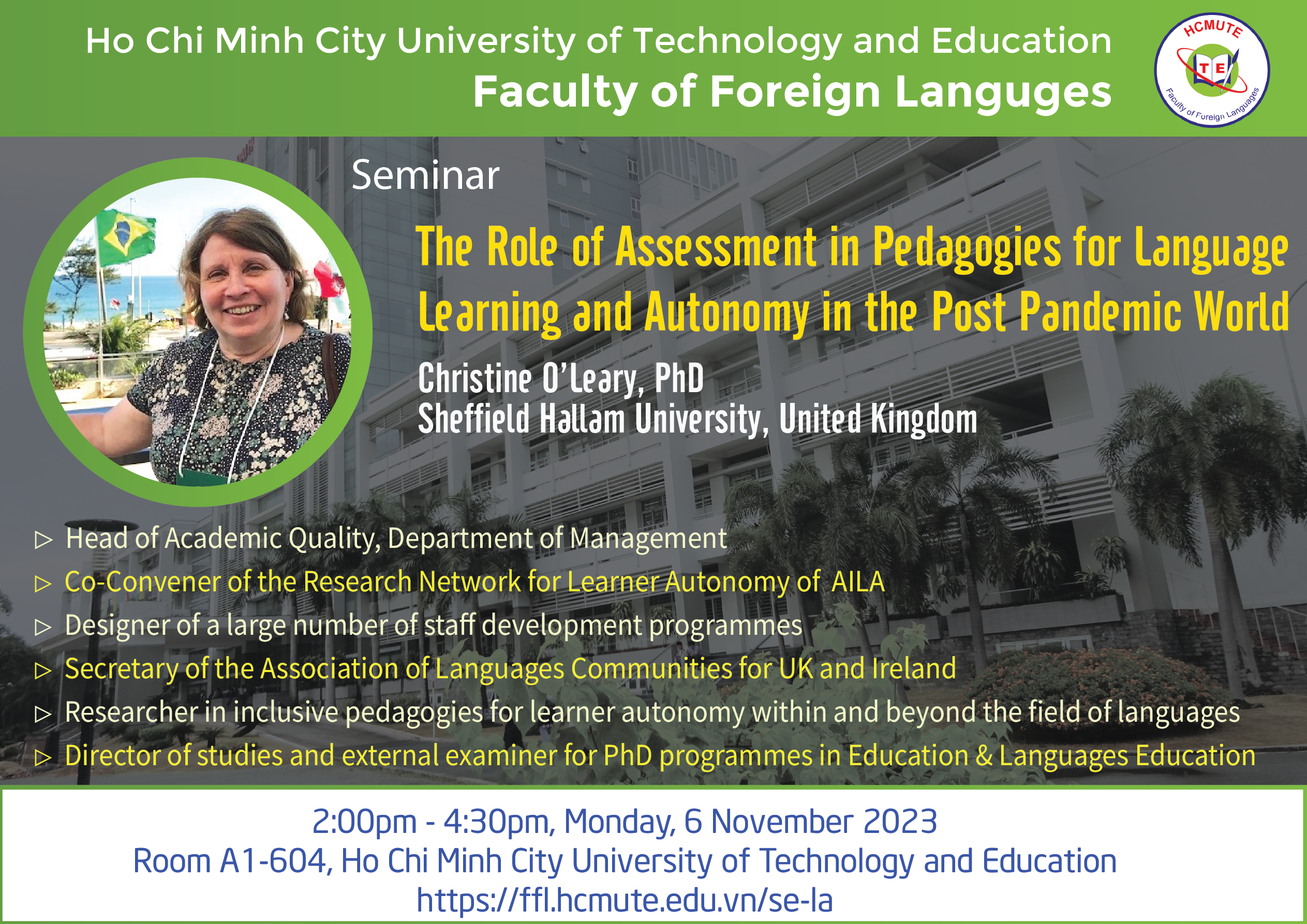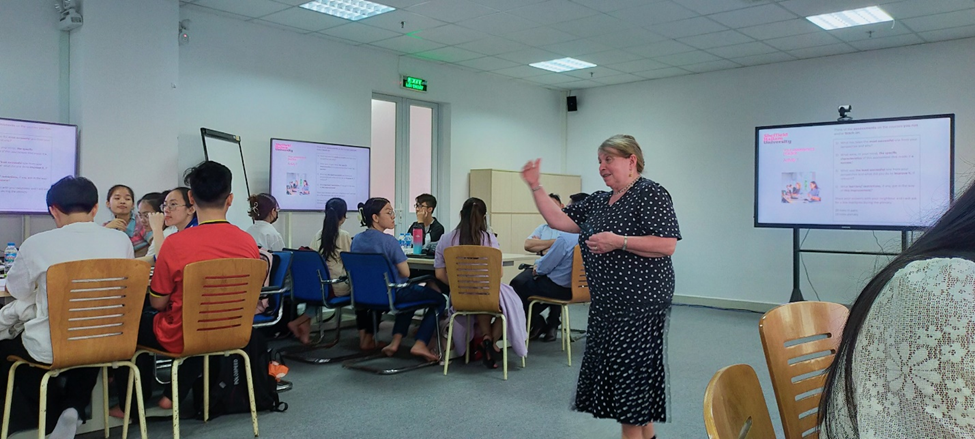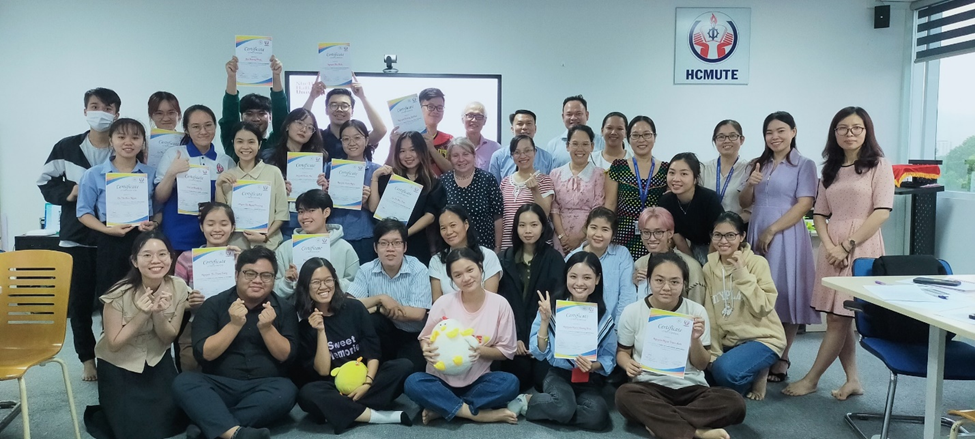The Role of Assessment in Pedagogies for Language Learning and Autonomy in the Post Pandemic World
Dr. Christine O’Leary, Sheffield Hallam University, United Kingdom
2:00pm - 4:30pm, Monday 6 Nov 2023
Room: A1-604, 1 Vo Van Ngan Street, Linh Chieu Ward, HCMC
Tóm tắt
The recent pandemic has caused a step-change in the way many institutions approach teaching and learning (Pokhrel & Chhetri, 2021), with an opportunity to rethink traditional models and explore the affordances of digital technologies in Higher Education Pedagogy (Navarro Cira & Carillo López, 2020), including more agentic assessment with the opportunity for choice and a multimodal approach (Silseth and Gilje, 2017). The recent growth in generative artificial intelligence software such as ChatGBT has further challenged traditional methods of assessment, such as essays or questions of a more general nature (Moqbel & Al-Kadi, 2023). Within a social context, the concept of learner autonomy, usually defined as students’ ability and willingness to take charge of their own learning independently and interdependently (Benson, 2011), has close association with the concept of learner agency, defined by Ahearn (2001) as a socioculturally mediated capacity to act, and Freire’s (1972) political transformation-oriented concept of empowerment (see Gao & Zhang, 2011; Nicolaides, 2017). Assessment can play a key role in fostering effective learning (Sadler, 2010; Stobart, 2023), the development of learner autonomy and emotional intelligence to promote learners’ well-being and resilience (O’Leary, 2014, 2018). This presentation will explore the benefits of developing assessment which promote student agency and autonomy within a student-centred higher education languages curriculum.
Tài liệu tham khảo
Ahearn, L. M. (2001). Language and agency. Annual Review of Anthropology, 30(1), 109-137.
Benson, P. (2011). Teaching and Researching Autonomy in Language Learning (2nd ed). Longman.
Freire, P. (1972). Pedagogy of the Oppressed. Penguin Books.
Gao, X. & Zhang, L. J. (2011). Joining forces for synergy: Agency and metacognition as interrelated theoretical perspectives on learner autonomy. In G. Murray, X. Gao, & T. Lamb (Eds.), Identity, Motivation and Autonomy in Language Learning (pp. 25-41). Multilingual Matters.
Navarro Cira, B. E., & Carillo López, I. (2020). COVID-19, a breakthrough in educational systems: Keeping the development of language learners’ autonomy at Self-Access Language Centres. Studies in Self-Access Learning Journal, 11(3), 220–234. https://doi.org/10.37237/110309
Nicolaides, C. (2017). Agency and empowerment towards the pursuit of sociocultural autonomy in language learning. In C. Nicolaides & W. Magno e Silva (Eds), Innovations and Challenges in Applied Linguistics and Learner Autonomy (pp.19-41). Pontes Editores.
O'Leary, C. T. C. (2014). Developing autonomous language learners in higher education: A social constructivist perspective. In G. Murray (Ed.), Social Dimensions of Autonomy in Language Learning (pp. 15-36). Palgrave Macmillan.
O'Leary, C. (2018). Exploring the development of learner autonomy from a postmodern and social constructivist perspective: Prioritising voices. The Learner Development Journal, 2.
Raes, A., Detienne, L., Windey, I. et al. (2020). A systematic literature review on synchronous hybrid learning: Gaps identified. Learning Environment Research, 23, 269–290. https://doi.org/10.1007/s10984-019-09303-z.
Sadler, R. D. (2010). Beyond feedback: Developing student capability in complex appraisal. Assessment and Evaluation in Higher Education, 35(5), 535-550.
Silseth, K. & Gilje, O. (2019). Multimodal composition and assessment: A sociocultural perspective. Assessment in Education: Principles, Policy and Practice, 26(1), 26-42. https://doi.org/10.1080/0969594X.2017.1297292.
Stobart, G. (2023). Alternative assessment. In R. J Tierney; F. Rizvi & K. Ercikan (Eds.), International Encyclopedia of Education (4th ed.) (pp. 96-102). Elsevier. https://doi.org/10.1016/B978-0-12-818630-5.09018-7.
Moqbel, M. S. & Al-Kadi, A. (2023). Foreign language learning assessment in the age of ChatGPT: A theoretical account. Journal of English Studies in Arabia Felix, 2(1), 71–84. https://doi.org/10.56540/jesaf.v2i1.62.
Thông tin diễn giả
Dr Christine O’Leary is a Principal Lecturer at Sheffield Hallam University, in the UK, where she has held a number of leadership roles, including Head of Languages and Cultures and Assessment lead for her Faculty. She co-leads the Research Network for Learner Autonomy of the International Association of Applied Linguistics (AILA) and is Secretary of the Association of Languages Communities for UK & Ireland. She has a wide-ranging experience in designing and leading programmes of study, in Languages and Research Methods. She is an experienced doctoral director of studies and external examiner for PhD programmes in Education and Languages Education. She has designed and led a large number of staff development programmes both within her institution and externally. Her research interests focus on inclusive pedagogies for learner autonomy within and beyond the field of languages, and research- informed assessment practices. She has presented and published widely in these areas in the last 25 years.
Đăng ký: Trực tuyến tại đây.

Vào đúng ngày 6 tháng 11 năm 2023, buổi hội thảo về tính tự chủ của người học và kiểm tra đánh giá đã diễn ra thành công tốt đẹp. Tiến sĩ Christine O’Leary đã báo cáo cùng với sự tham gia của hơn 50 giảng viên và sinh viên trường Đại học Sư phạm Kỹ Thuật Thành phố Hồ Chí Minh (ĐHSPKT) và các trường lân cận. Buổi hội thảo mang đến cho người tham gia cơ hội thảo luận về cách duy trì và phát triển tính tự chủ của người học thông qua các phương pháp kiểm tra đánh giá khác nhau.

Trong bài báo của mình, Tiến sĩ Christine không chỉ giới thiệu về những xu hướng mới trong giáo dục ngôn ngữ sau đại dịch COVID mà còn nhấn mạnh những cơ hội và thách thức khi trí tuệ nhân tạo xuất hiện, như trường hợp của ChatGPT.

Buổi hội thảo đã tạo ra một không khí tương tác tích cực, nơi mà giảng viên và sinh viên thảo luận cởi mở về cách duy trì và phát triển tính tự chủ của người học thông qua các phương pháp kiểm tra đánh giá đa dạng. Sinh viên tại khoa Ngoại ngữ ĐHSPKT TP.HCM đã chủ động tham gia và trao đổi sôi nổi với Tiến sĩ Christine, học hỏi thêm nhiều kiến thức mới và mở rộng sự hiểu biết về dạy và học ngoại ngữ.

Kết thúc sự kiện, Tiến sĩ Christine đã trao tặng chứng chỉ tham gia cho giảng viên và sinh viên, khép lại một hội thảo ý nghĩa và thành công tốt đẹp.

Trong bối cảnh giáo dục đang trải qua những biến động lớn, buổi hội thảo không chỉ là cơ hội để đàm luận về những xu hướng mới mà còn thúc đẩy sự hợp tác và tương tác giữa giảng viên và sinh viên. Sự trao đổi này là nền tảng cho những buổi thảo luận sâu sắc về tính tự chủ của người học và các phương pháp kiểm tra đánh giá trong giáo dục ngôn ngữ trong tương lai.
- 1 view




























